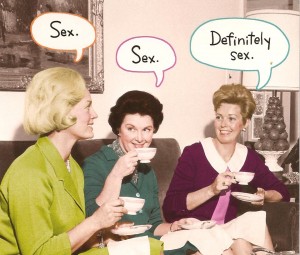Time to tear off those pesky June Cleaver masks. Women work day in and day out to put up a good front. Not only is it exhausting to appear decked out in our pearls as we vacuum, but a new study shows that we’ll be happier through honest connection, engaging in depth with others, than when we chatter on at only surface level.
In research at the University of Arizona, the happiest people engaged in only one-third as much small talk as the unhappiest participants. Happy people engaged in twice as many substantive conversations, and spent 25 percent less time alone, than unhappy people. The link is well-documented between loneliness and depression. Even when I was in grad school thirty years ago, research was clear that feeling connected to others was a key factor for happiness and for health.
Women often battle the urge to conceal their troubles, rather than speak honestly about the challenging, tedious parts of their lives. Why invest so much energy in projecting the image that we’ve “got it all together?”
1) We secretly suspect that we’re the only one for whom it’s hard. Everyone else has twenty balls in the air and a smile on her face. We think “there must be something the matter with me,” as another ball goes careening out of reach. “If I were only stronger, smarter, more organized, a better multitasker. If everyone else’s life is smooth, it must be me who is defective, weak, or less than.”
2) We are certain others don’t want to hear us kvetch. Complaining is not attractive. People will tire of it, shy away, judge, or label the complainer as a downer or even a bitch.
Straight thinking is helpful. Is everyone else truly surfing breezily through the stresses in their lives? Are you the only woman out of 82.8 million who forgot her pearls today? Really? Are you accurately judging the ratio of calm versus chaos that you are expressing? Is 100% of your conversation constantly stewed in negativity?
Aim for moderation and middle ground. Yes, perhaps, if all you ever do is bitch, others might tune you out. I believe most women err on the side of minimizing life’s thorns, blocking honest communication and connection, than on spewing complaints 168 hours a week. Besides, it’s not the complaining that drives others away. Listeners shy away if they feel uncomfortable with the topic, or when the complainer doesn’t listen to suggestions, can’t be consoled, or goes on like a CD on repeat, ignoring possible remedies. If a friend is interested and listens, we need to honor her efforts with action on our problems.
I find that a simple expression of “poor baby” is incredibly helpful. When we kvetch, we validate each other. We empower our friends by saying “I get it, I know where you’re coming from.” We feel less alone and less defective.
Remember, June Cleaver only had to parent 20 minutes per week. She had no carpools to drive and no boss-imposed deadlines for her pies or her dusting. We feel better when we acknowledge that life is hard for women in this century–maybe the challenges are different than in previous generations, but hard nevertheless. None of us is perfect. All of us have trials. There’s nothing the matter with me–I’m just part of the whole race of women, tromping through the overkill of daily demands. When we connect through honesty, we feel happier, less alone, and healthier, too.






